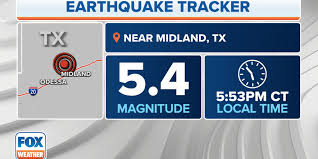Significant EARTHQUAKE Shakes Oil & Gas Region of Texas AGAIN

The leading explanation involves the high pressure injection of residual brines from fracking operations
From an Article by Andrew Wulfeck, New York Post, 12/24/22
Nearly a month after a magnitude-5.4 earthquake rocked parts of the Lone Star State, residents were again caught off guard Friday evening by another magnitude-5.5 quake centered near the town of Midland.
The United States Geological Survey reported the quake took place about 3 miles under the rural Texas terrain, but the shaking was reported over a wide area that stretched from New Mexico through the heart of Texas.
Seismologists said small earthquakes are not uncommon in Texas, but larger events are rare. Many of the quakes are linked to oil fracking and the reinjection of fluids underground.
“The area is known for oil and gas production, so that will research. We’re sure people are going to be looking at the number of wastewater injection sites in the region,” a USGS seismologist said.
November’s 5.4-magnitude, which occurred about 100 miles away from the epicenter of Friday’s quake, caused the state’s oil and gas regulators to propose tougher temporary restrictions on oil and gas production to help limit seismic activity.
Seismologists said it was still too early to determine whether the most recent quake is linked to wastewater injection. Still, researchers will be working around the clock to determine the cause.
There were no initial reports of significant damage around the quake’s epicenter or in other regions of Texas.
If the magnitude is not adjusted downward, the quake will rank as one of the strongest to impact the region. According to USGS records, a magnitude-6.0 earthquake that shook the town of Valentine in 1931 holds the record for being the largest to impact the state.
#######+++++++#######++++++++
MORE THAN YOU WANT TO KNOW, LESS WELL EXPLAINED: To ease looming West Texas water shortage, oil companies have begun recycling fracking wastewater, Dylan Baddour, Inside Climate News, The Texas Tribune, December 19, 2022
Oil and gas companies are increasingly reusing “produced water” as West Texas aquifers are being depleted and the practice of injecting wastewater into disposal wells triggers more earthquakes.